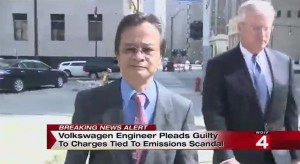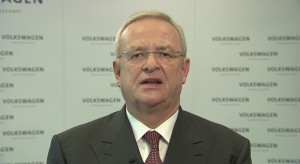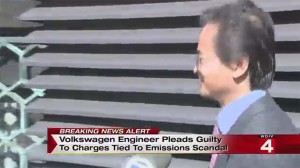
VW diesel engineer James Liang could help investigators trace who was responsible for the emissions cheating scandal. Photos courtesy WDIV.
A long-time Volkswagen engineer has pleaded guilty to wire fraud in connection with Volkswagen’s diesel emissions test cheating scandal, and 62-year-old James Robert Liang now plans to cooperate with the U.S. Justice Department’s ongoing criminal investigation.
Liang, who is a German native but also has a house in Newberry Park, California, spent 25 years working in the VW Diesel Development Department. During his assignment, the automaker found itself unable to deliver on a goal of boosting fuel economy and performance while driving down emissions, so Liang and his colleagues came up with software meant to temporarily cut pollutants during emissions tests.
“Mr. Liang came to Detroit today to accept responsibility for his actions,” one of his attorneys said outside the U.S. District Court in Detroit where Liang entered his guilty plea. “He is one of many people at Volkswagen who got caught up in this emissions scandal and he’s very remorseful for what occurred.”
Who else might be caught up remains uncertain. Justice investigators have targeted other, unnamed co-conspirators, and an ongoing question is how far up the chain of command the probe might reach.
German prosecutors have taken their probe all the way up to former Volkswagen AG CEO Martin Winterkorn who is suspected of having hidden his knowledge of the emissions scandal rather than advising company shareholders of the potential impact on VW’s stock price. Current Volkswagen brand boss Herbert Diess is believed to be under investigation by German authorities.
For its part, VW issued a terse response to Liang’s guilty plea, saying that it “is continuing to cooperate with the U.S. Department of Justice. We cannot comment on this indictment.”
Volkswagen has been one of the most aggressive manufacturers when it comes to marketing fuel-stingy diesels in the U.S. Prior to the scandal, those engines were fitted into about a quarter of the vehicles VW sold in the States. But facing ever tougher emissions standards, both here and abroad, the maker found itself in a tough position. And when it couldn’t make the numbers work Liang and his team turned to subterfuge.
Their software was capable to detecting when a vehicle was running in an emissions lab, in part by sending that the steering wheel was not being turned, even at simulated highway speeds. In such circumstances, the vehicle’s engine controls sharply reduced the output of pollutants like smog-causing oxides of nitrogen. On the road, however, the vehicles would produce up to 40 times more of those emissions.
(VW pondering complete takeover of Navistar. Click Here for more.)
The scandal broke last September when the U.S. Environmental Protection Agency publicly accused VW of rigging its diesel engines. Shortly after the EPA announcement, VW acknowledged the subterfuge. It subsequently admitted rigging a higher-end 3.0-liter diesel, as well.

German prosecutors are looking to see if former CEO Winterkorn withheld information from shareholders about the scandal.
In June, the automaker agreed to settle a civil probe covering just the smaller engine, paying a $14.7 billion penalty as part of a deal involving the U.S. Justice Dept., the EPA, the Federal Trade Commission and the California Air Resources Board, or CARB. Of that, $2.0 billion will be used to promote the sale of zero-emissions vehicles, while $2.7 billion will go to remediation efforts meant to offset the added pollution caused by the VW engines.
But the bulk of the payment, just over $10 billion, will be used to buy back and scrap about 475,000 VW diesel vehicles or repair them. The automaker continues to work with U.S. and California authorities on a possible fix for both of the tainted diesel engines. While repairs have begun on another 10.5 million vehicles VW sold overseas, no effective fix has yet been found for meeting the tougher U.S. emissions standards.
“We’re holding Volkswagen responsible for distorting the market for clean cars,” said EPA Gina McCarthy, the head of the EPA, at a June 28th news conference. McCarthy called the settlement “unprecedented,” and a “groundbreaking achievement.”
A settlement covering the 3.0-liter engine has yet to be completed. It is expected to be significantly smaller than the earlier deal. But VW faces significant additional costs. There are numerous lawsuits outstanding, brought by diesel owners, VW dealers, and by shareholders who have seen the value of their investments tumble since last year.
(Dealers latest to settle. Click Here for details.)
Late last month, VW reached a tentative settlement with 650 dealers worth about $1.2 billion.
VW earnings have been hard hit by the scandal, and the impact is likely to be felt for some time. Meanwhile, the maker has been shifting its corporate focus, de-emphasizing its diesel technology while putting more focus on electrified drivetrains. VW expects to have at least 20 plug-in hybrids and pure battery-electric models in its line-up by 2020, and 30 by 2025.
(Despite retreat by some makers, diesel isn’t dead yet. Click Here for the story.)

